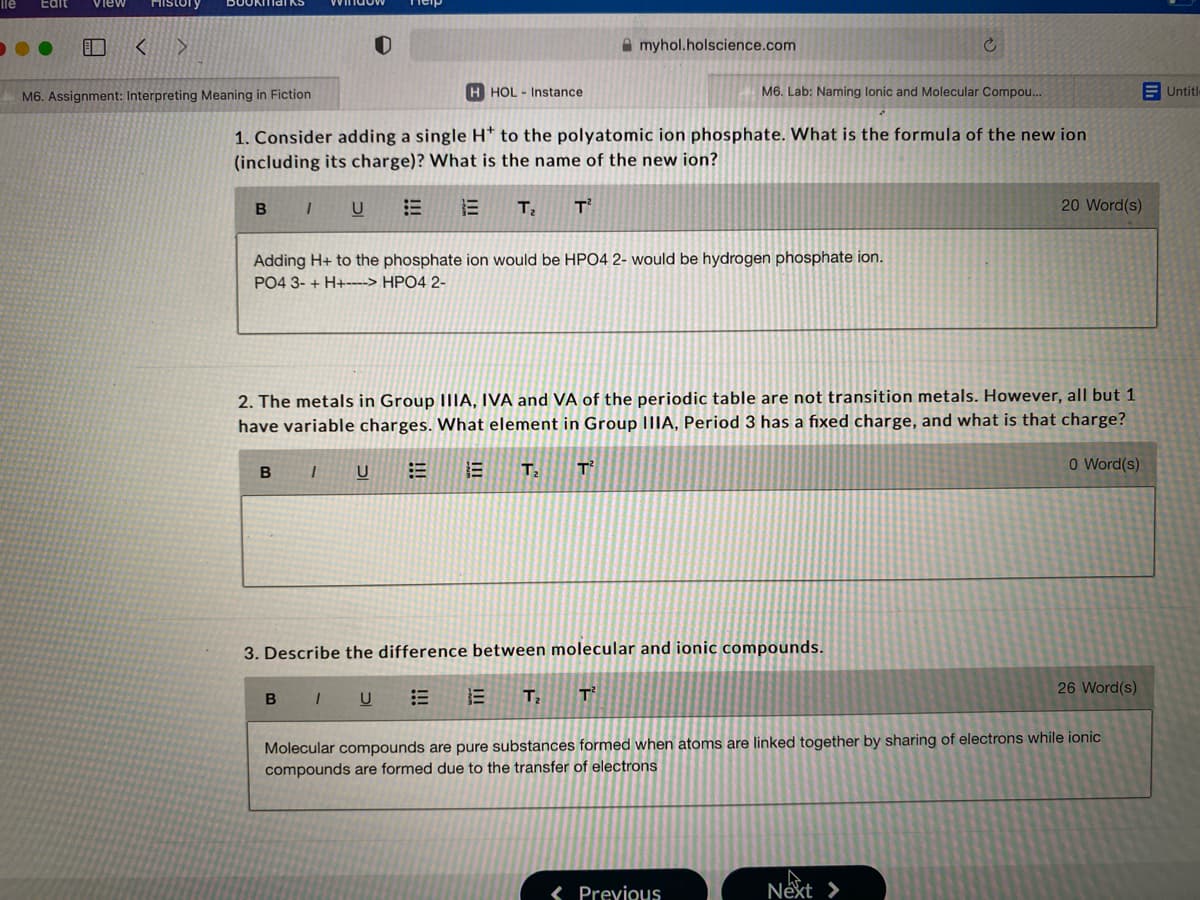2. The metals in Group IIIA, IVA and VA of the periodic table are not transition metals. However, all but 1 have variable charges. What element in Group IIIA, Period 3 has a fixed charge, and what is that charge?
2. The metals in Group IIIA, IVA and VA of the periodic table are not transition metals. However, all but 1 have variable charges. What element in Group IIIA, Period 3 has a fixed charge, and what is that charge?
Chemistry: The Molecular Science
5th Edition
ISBN:9781285199047
Author:John W. Moore, Conrad L. Stanitski
Publisher:John W. Moore, Conrad L. Stanitski
Chapter2: Chemical Compounds
Section: Chapter Questions
Problem 118QRT
Related questions
Question
#2

Transcribed Image Text:ile
Edit
View
History
A myhol.holscience.com
H HOL Instance
M6. Lab: Naming lonic and Molecular Compou...
E Untitle
M6. Assignment: Interpreting Meaning in Fiction
1. Consider adding a single H* to the polyatomic ion phosphate. What is the formula of the new ion
(including its charge)? What is the name of the new ion?
B I
20 Word(s)
Adding H+ to the phosphate ion would be HPO4 2- would be hydrogen phosphate ion.
PO4 3- + H+----> HPO4 2-
2. The metals in Group IIIA, IVA and VA of the periodic table are not transition metals. However, all but 1
have variable charges. What element in Group IIIA, Period 3 has a fixed charge, and what is that charge?
B IU
T2
T
O Word(s)
3. Describe the difference between molecular and ionic compounds.
26 Word(s)
B I U
E E T, T
Molecular compounds are pure substances formed when atoms are linked together by sharing of electrons while ionic
compounds are formed due to the transfer of electrons
< Previous
Next >
Expert Solution
This question has been solved!
Explore an expertly crafted, step-by-step solution for a thorough understanding of key concepts.
This is a popular solution!
Trending now
This is a popular solution!
Step by step
Solved in 3 steps

Knowledge Booster
Learn more about
Need a deep-dive on the concept behind this application? Look no further. Learn more about this topic, chemistry and related others by exploring similar questions and additional content below.Recommended textbooks for you

Chemistry: The Molecular Science
Chemistry
ISBN:
9781285199047
Author:
John W. Moore, Conrad L. Stanitski
Publisher:
Cengage Learning


Chemistry
Chemistry
ISBN:
9781305957404
Author:
Steven S. Zumdahl, Susan A. Zumdahl, Donald J. DeCoste
Publisher:
Cengage Learning

Chemistry: The Molecular Science
Chemistry
ISBN:
9781285199047
Author:
John W. Moore, Conrad L. Stanitski
Publisher:
Cengage Learning


Chemistry
Chemistry
ISBN:
9781305957404
Author:
Steven S. Zumdahl, Susan A. Zumdahl, Donald J. DeCoste
Publisher:
Cengage Learning

Introductory Chemistry: A Foundation
Chemistry
ISBN:
9781337399425
Author:
Steven S. Zumdahl, Donald J. DeCoste
Publisher:
Cengage Learning

Chemistry for Engineering Students
Chemistry
ISBN:
9781337398909
Author:
Lawrence S. Brown, Tom Holme
Publisher:
Cengage Learning

Chemistry: An Atoms First Approach
Chemistry
ISBN:
9781305079243
Author:
Steven S. Zumdahl, Susan A. Zumdahl
Publisher:
Cengage Learning